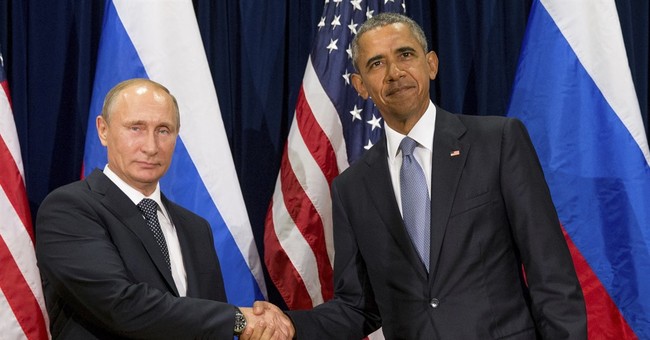Reminder: The Obama Administration Has A Terrible Record On Russia

Being sufficiently anti-Russian has become a significant measure of credibility in Washington over the past year. Today at Politico Magazine author James Kirchick looks back at the Obama administration’s record in this regard and finds it lacking.
Many of the points Kirchick makes are ones Hot Air readers will already be familiar with. I’ve lost count of the number of times I’ve posted video of Obama mocking Mitt Romney about Russia being our number one geopolitical foe during a 2012 debate. What’s impressive about Kirchick’s piece is the number of points he rallies to make the case that many “latter-day Democratic Cold Warriors” are speaking as if the past 8 years never happened.
From the reset, which it announced in early 2009 just months after Russia invaded Georgia, to its removal of missile defense systems in the Czech Republic and Poland later that year, to its ignoring Russia’s violations of the 1987 Intermediate-Range Nuclear Forces Treaty (while simultaneously negotiating New START) and its ceding the ground in Syria to Russian military intervention, the Obama administration’s Russia policy was one, protracted, 8-year-long concession to Moscow. Throughout his two terms in office, Obama played down the threat Russia posed to America’s allies, interests and values, and ridiculed those who warned otherwise. “The traditional divisions between nations of the south and the north make no sense in an interconnected world nor do alignments of nations rooted in the cleavages of a long-gone Cold War,” Obama lectured the United Nations General Assembly in 2009, a more florid and verbose way of making the exact same criticism of supposed NATO obsolescence that liberals would later excoriate Donald Trump for bluntly declaring…Downplaying both the nature and degree of the Russian menace constituted a major component of mainstream liberal foreign policy doctrine until about a year ago – that is, when it became clear that Russia was intervening in the American presidential race against a Democrat. It provided justification for Obama’s humiliating acceptance in 2013 of Russia’s cynical offer to help remove Syrian chemical weapons after he failed to endorse his own “red line” against their deployment. Not only did that deal fail to ensure the complete removal of Bashar al-Assad’s stockpiles (as evidenced by the regime’s repeated use of such weapons long after they were supposedly eliminated), it essentially opened the door to Russian military intervention two years later.
Again, you need to read the entire thing but Kirchick argues that the push to make Russia toxic is more about justifying Hillary’s loss and going after Trump than it is about Russia itself. How would we know if Democrats were really serious about Russia? They’d be a lot more critical of the past 8 years of missteps and underestimation by Obama.
Are liberals willing to admit the reset was a giant miscalculation from the start? Are they willing to support sending arms to Ukraine? To redeploy missile defense systems to allies in Eastern Europe? Are they willing to concede that Obama’s Syria policy was an epic disaster that paved the way for Russia’s reemergence as a Middle Eastern military power? Are they, in other words, willing to renounce the foreign policy legacy of one of their most popular leaders? Because only that will demonstrate they’re serious about confronting Russia.
Democrats are as serious about being anti-Russia as they were about being anti-war. You’ll recall how there were big anti-war demonstration in many cities until the end of the Bush administration. Then, when Obama took over and subsequently announced the Afghan surge, there was…nothing. The anti-war left crawled back into the woodwork and stayed there. The overwhelming majority only cared about the issue to the degree it hurt the other guy and not their guy. That’s why criticism of the previous administration’s mistakes have been so muted even as the issue of dealing with Russia has exploded.
I really have lost track of how many times I’ve posted this one, but here it is again:
Bonus clip: “I transmit this information to Vladimir.”
No comments:
Post a Comment